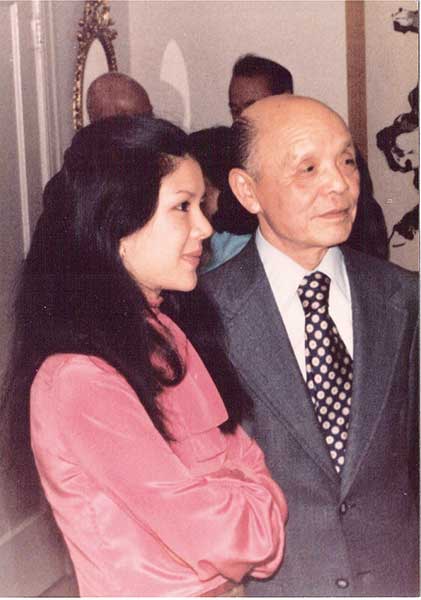Chinese diplomat honored for saving thousands of jews
By Manli Ho ( China Daily ) Updated: 2015-05-30 07:42:02
 |
|
Feng Shan Ho and his daughter Manli Ho in 1977.[Photo provided to China Daily] |
Destination: Shanghai
But unlike his fellow diplomats, my father faced a unique dilemma at that time: Most of his home country and all its ports of entry had been occupied by the Japanese since 1937. Any document or entry visa issued by a Chinese diplomat would certainly not be recognized by the Japanese occupiers.
In order to help Jewish refugees, my father came up with an ingenious way to use an entry visa as a means of exit or escape.
His entry visas were issued to only one end destination - Shanghai. The Shanghai visas would provide Jewish refugees in Austria with the proof of emigration required by the Nazis to leave.
Practicing what he called a "liberal policy", my father authorized the issuing of visas to any and all who asked. Armed with a Shanghai end destination visa, Jews could then obtain transit visas to escape to other countries.
"I knew that the visas were to Shanghai 'in name' only", my father would later recall. "In reality, they provided a means for Austrian Jews to find a way to get to the United States, England or other preferred destinations."
Many Jews were also released from the concentration camps of Dachau and Buchenwald on the strength of these Shanghai visas.
Shanghai itself, however, required no entry papers. In 1937, the city had fallen into the hands of the Japanese. The Chinese Nationalist government had retreated to Chongqing, leaving Shanghai harbor wide open, without passport control or immigration. As a result, anyone could land without papers.
In making Shanghai an end destination, my father provided a failsafe to refugees not able to land elsewhere. Word spread quickly to Jews in other Nazi-occupied territories that in China there existed a refuge which required no entry papers.
That is the reason that the majority of the 18,000 Jewish refugees who ended up in Shanghai were from Germany, not Austria. Most of the Austrian Jews who were able to obtain visas from my father's consulate used them as a means to escape elsewhere - Cuba, the Philippines, England, North and South America and Palestine.
The first visa recipient I tracked down was the late Eric Goldstaub of Toronto, who did go to Shanghai.
Goldstaub recalled that he visited 50 foreign consulates in Vienna before obtaining 20 visas from the Chinese consulate. It was to a place, Goldstaub recounted, most Austrian Jews had never even heard of, much less dreamt of going to.
When the anti-Jewish pogrom known as Kristallnacht erupted in Germany and Austria on November 9-10, 1938, both Goldstaub and his father were arrested and imprisoned, but with the Shanghai visas as proof of emigration, they were released within days and embarked on their journey to Shanghai.
On Kristallnacht, my father himself faced down the Gestapo at gunpoint to help his Jewish friends, the Rosenbergs, to whom he had issued visas to Shanghai. He had come to their home to see them off. Because of my father's intervention, Mr. Rosenberg was released from detention, and the family was able to leave Vienna safely for Shanghai.
Other families, such as that of Karl Lang, did not have such personal intervention on Kristallnacht. Lang's daughters, Marion Alflen and Susie Margalit, recalled later that their father was arrested and deported to Dachau concentration camp. He was released only after their mother was able to obtain a Shanghai visa and present it to Nazi authorities as proof of emigration. The Lang family left Austria for England and then made their way to the United States.
In the meantime, Chen Jie, the Chinese ambassador to Berlin and my father's direct superior, was concerned that my father's issuance of visas on such a large scale would damage Sino-German relations. He ordered my father to desist, but my father disobeyed the order and continued to issue visas. My father was later punished for his disobedience, receiving a demerit in his record.
In early 1939, the consulate's building - on which the plaque was placed in his honor last month - was confiscated by the Nazis and my father was forced to relocate to smaller quarters at his own expense.
|
|
|
|
|
|
|
|

























 Raymond Zhou:
Raymond Zhou: Pauline D Loh:
Pauline D Loh: Hot Pot
Hot Pot Eco China
Eco China China Dream
China Dream China Face
China Face






